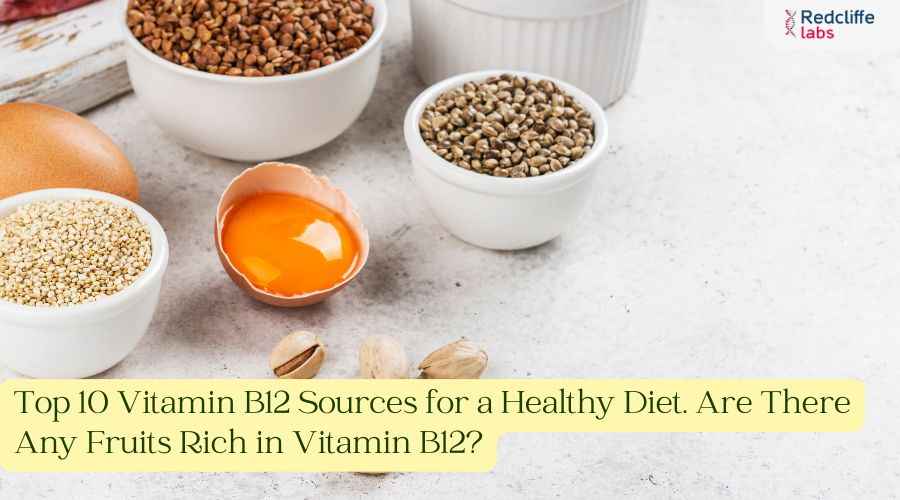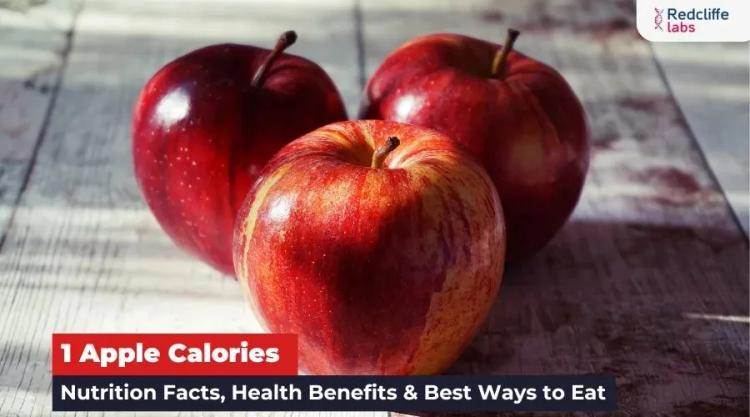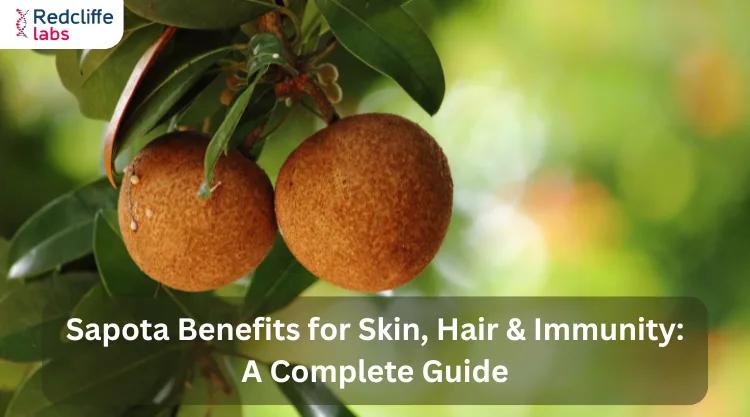Top 10 Vitamin B12 Sources for a Healthy Diet. Are There Any Fruits Rich in Vitamin B12?

Medically Reviewed By
Dr. Geetanjali Gupta
Written By Muskan Taneja
on Oct 21, 2024
Last Edit Made By Muskan Taneja
on Jul 19, 2025

Do you know the power of vitamin B12?
Vitamin B12 is a water-soluble vitamin that is naturally present in some foods, added to fortified foods, and available as a dietary supplement. This vitamin is essential for development and allows the central nervous system (your brain and spinal cord) to function properly. It is also crucial for the formation of red blood cells and DNA synthesis.
The reference daily intake (RDI) is approximately 2.4 micrograms (mcg), which is slightly higher than that of pregnant or breastfeeding mothers.
It is essential to know that your body doesn’t produce vitamin B12, and you obtain it from foods of animal origin, like meat or supplements. Additionally, if you don’t eat animal products, you can include vitamin B12-fortified foods, cereals, or supplements.
B12 deficiency is a common worry in India, where many people follow vegetarian or vegan diets. Research indicates that approximately 47% of North Indians, particularly those with diabetes, are vitamin B12 deficient compared to the general population. If this deficit is not treated, it can cause anemia, weakness, exhaustion, and nerve problems.
While animal-based meals are the primary source of vitamin B12, such as meat, offal, fish, seafood, dairy products, and eggs, certain vitamin B12 foods, especially those that have been fortified, can increase vitamin B12 levels in vegans. Raising the level of B12 in vegans through pharmaceutical supplements or brewer’s yeast and certain types of seaweed can help.
Additionally, artificially supplemented foodstuffs such as cereals, also known as vegan cereals, like total cornflakes, unsweetened soya drinks fortified with vitamin B12, and nutritional yeast flakes fortified with vitamin B12 can offer a great substitute.
However, if you are looking for Vitamin B12-rich fruits, some studies suggest that certain vitamin B12 fruits, such as bananas, apples, and berries (blueberries and strawberries), can increase vitamin B12 levels. No significant B12 content is present in these fruits to meet your needs.
But how will you recognize the vitamin B12 deficiency? Certain symptoms of vitamin B12 can help you identify whether you are deficient or not.
- Heart palpitations
- Weakness
- Yellowish skin
- Issues in balancing
- Rapid breathing or breathlessness
- Numbness or tingling in hands or feet
- Confusion or memory loss
- Depression
- Irritability
- Nausea or vomiting
List of Vitamin B12 Sources You May Like to Know
Below are some excellent sources of vitamin B12 for vegetarians and vegans. Let’s learn about them in detail.
5 Best Vitamin B12 Sources for Vegetarians:
- Dairy products
- Fortified foods
- Eggs
- Mushrooms
- Tempeh, Sauerkraut, and Kimchi
Let’s discover them in detail.
1. Cow’s milk and other dairy products
Dairy products like milk, yogurt, and cheese contain protein and other vital nutrients, including vitamin B12.
One cup of whole milk (240 ml) can provide up to 46% of the Daily Value (DV) for vitamin B12.
Cheese and plain full-fat yogurt are also significant sources of vitamin B12. For instance, a large slice (22 grams) of Swiss cheese can fulfill up to about 28% of the DV.
2. Fortified foods
Plant-based milk is considered a nourishing vegan alternative to dairy milk.
Although soy, almond, and rice milk do not naturally contain vitamin B12, they are typically fortified, making them a great source of this essential vitamin.
A single cup of soy milk (240 mL) can provide up to 86% of the Daily Value (DV) for vitamin B12.
Fortified cereal is a synthetic source of vitamin B12, compatible with vegetarians and vegans, as it is not sourced from animals.
Fortified cereals are not often included in a healthy diet, but they can meet the needs for a source of B vitamins, particularly B12. Food fortification involves the addition of nutrients that are not naturally present in the food.
Fortified cereals such as Malt-O-Meal Raisin Bran provide up to 62% of the Daily Value (DV) for vitamin B12 in a single cup (59 grams).
A study reveals that regular consumption of fortified cereals can enhance vitamin B12 levels.
Did you Know?
A 2004 study reveals that consuming 1 cup (240 mL) of fortified cereal containing 4.8 mcg (200% of the DV) of vitamin B12 led to a notable increase in vitamin B12.
3. Eggs
Eggs contain protein and B vitamins, particularly B2 and B12. Consuming two large eggs (weighing 100 grams) can provide approximately 39% of the DV for vitamin B2, along with 46% of the Daily Value (DV) for vitamin B12.
Studies reveal that egg yolks contain more vitamin B12 than egg whites and are easily absorbed by the body. Thus, consuming whole eggs rather than just the whites is advisable.
4. Mushrooms
Mushrooms are a potential source of vitamin B12 for vegetarians, but they offer small amounts of B12 content.
Some varieties, such as shiitake mushrooms, contain trace amounts of B12, white button mushrooms may offer minimal B12, and crimini and portobello mushrooms may contain very small amounts.
Nonetheless, the amount is usually low enough to meet your daily expectations, but it is still beneficial.
5. Tempeh, Sauerkraut, and Kimchi
Fermented foods such as tempeh, sauerkraut, and kimchi offer small amounts of vitamin B12. This is due to their bacterial activity during fermentation. Both foods are also excellent sources of probiotics, which help support your gut health and digestion.
Additionally, some types of seaweed, such as spirulina and chlorella, can be good sources of omega-3 fats and vitamin B12, but they are not considered the most reliable sources.
Now, let’s explore some of the best sources of vitamin B12 for vegans:
If you or anyone you know is a vegan, you must rely on fortified foods and supplements to get enough vitamin B12.
5 Best Sources of Vitamin B12 for Vegans:
- Fortified nutritional Yeast
- Fortified plant-based Milk
- Fortified breakfast cereals
- Fortified tofu
- Fortified plant-based meats
1. Fortified Nutritional Yeast
Nutritional yeast is a type of yeast specifically cultivated for consumption. It is a valuable source of protein, vitamins, and minerals.
Naturally, nutritional yeast does not contain vitamin B12, but it is frequently fortified with vitamin B12 to help the body make and maintain DNA and red blood cells.
As with fortified cereals, nutritional yeast's vitamin B12 is suitable for vegans because it is produced synthetically, a two-tablespoon serving (15 grams) of nutritional yeast can provide up to 733% of the Daily Value for vitamin B12.
Additionally, a 2000 study revealed that nutritional yeast significantly increased vitamin B12 levels in vegans and decreased indicators of B12 deficiency.
2. Fortified Cereal (Other vitamins & Minerals added to the product)
Many breakfast cereals are packed with vitamin B12, making them a good source of vitamin B12 for vegans. Food manufacturers add synthetic B12 to cereals. Doing this makes cereals a reliable plant-based source, which may provide 100% or more of the daily B12 requirement per serving.
Some popular examples of fortified cereals for B12 include cornflakes, quaker oats, and whole-grain cereals.
Health Alert: To boost your vitamin B12 intake, always select a fortified cereal low in added sugars and rich in fiber or whole grains.
3. Fortified Plant-based milk
Since plant-based milk naturally doesn’t contain vitamin B12; therefore, it is fortified with synthetic (cyanocobalamin or methylcobalamin). Many fortified plant-based milks provide 1.5 to 3 mcg of B12 per cup.
Fortified plant-based milk, such as soy milk (which has protein levels equal to cow’s milk), almond milk, oat milk, coconut milk, and cashew and rice milk, is a reliable source of B12 for vegans.
4. Fortified tofu
Traditional tofu and plant-based meats do not naturally contain vitamin B12, some brands fortify them to make them a reliable source for vegans. Morinaga Silken Tofu is fortified with B12.
5. Fortified plant-based meats
Many mock meats such as burgers and sausages (beyond meat) are fortified plant-based meats for vegans that can raise B12 levels.
Animal-based Vitamin B12 Sources: Recommended Dosage
As hinted above, vitamin B12 is naturally found in animal products, allowing non-vegetarians to meet their daily intake. Below is a table showing some of the best animal-based sources of vitamin B12.
| Beef Liver | 70.6 mcg |
| Lamb Liver & Kidneys | 90 mcg & 52.4 mcg (both per 100 g) |
| Beef (Red Meat) | 6mcg (100 g) |
| Chicken and Turkey | 0.3–0.5 mcg (per 100g) |
| Clams | 84 mcg (per 85 g) |
| Sardines | 7.6 mcg (per 150 g) |
| Salmon, Tuna, Mackerel, Trout | 4.5–9 mcg (per 100g) |
| Milk | 1.2 mcg per cup (50% DV) |
| Yogurt | 1.3 mcg per cup (54% DV) |
| Cheese | 0.5–3.5 mcg per 100g |
| Whole Eggs | 0.6 mcg per large egg (25% DV) |
| Egg Yolks | More B12 than egg whites, approximately 0.33 mcg per yolk |
Key Takeaway
Vitamin B12 deficiency is a common problem in India, especially among vegetarians and vegans. One easy yet effective strategy is to rely on fortified foods such as nutritional yeast, plant-based milk such as almond milk, coconut milk, rice milk, and soy milk, and other plant-based sources of vitamin B12, such as cheese, Nori, and yogurt, and fortified tofu and mock meats, cereals, and B12 supplements.
Remember, as such, no vitamin B12-rich fruits can help. While no dry fruit is a leading source of Vitamin B12, almonds, raisins, and dates contain a notable amount of this essential nutrient.
Monitor your B12 levels and seek advice from a healthcare professional to prevent deficiencies and ensure a well-balanced diet.
Leave a comment
11 Comments
Anitha
Nov 19, 2025 at 4:53 PM.
My b12 level is very low
Myhealth
Nov 21, 2025 at 11:39 AM.
If your B12 level is very low, you should start treatment soon because it can cause weakness, tingling, and nerve problems. Include B12-rich foods like eggs, dairy, fish, and chicken (or fortified foods if you’re vegetarian), but usually diet alone is not enough. Most people need B12 supplements or injections for fast recovery, so it’s best to consult a doctor for proper dosage and monitoring.
Karandeep Singh
Apr 3, 2025 at 12:08 PM.
Good complete information
Myhealth Team
May 23, 2025 at 11:25 AM.
Thankyou! We are glad you have liked the information.
Bunny Seunath
Mar 24, 2025 at 6:03 PM.
Very informative and usefull Tks
Myhealth Team
Mar 25, 2025 at 4:56 PM.
You're Welcome! We are glad you have liked the information.
Mary Epke
Mar 21, 2025 at 4:46 PM.
I’m afraid that you are dangerously wrong in saying that any fruits contain B12. Where on earth did you get that TOTALLY FALSE information from ? Fruits and veg contain NO VITAMIN B12. They contain B9 called folate in food and folic acid in tablet form . Only meat , fish eggs and milk products contain B12. Best get rid of that false information asap .
Hafsa Salum
Mar 6, 2025 at 5:11 AM.
Thanks for everything
Myhealth Team
Mar 6, 2025 at 5:34 PM.
You're Welcome!
Mantuli
Jan 2, 2025 at 8:09 PM.
I have a problem of aching bones and joints and I cannot stand for long, my left leg becomes tired and painfull, is this also something to do with lak of b12?
Myhealth Team
Jan 7, 2025 at 1:26 PM.
Your symptoms may be linked to vitamin B12 deficiency, which can cause nerve damage, fatigue, and joint pain. Get a blood test to confirm and consult a doctor. Include B12-rich foods like eggs, dairy, or meat, or consider supplements if needed. Other causes like arthritis or poor circulation should also be evaluated.
ANISH
Nov 20, 2024 at 9:08 AM.
SEND ME DETAILS ON VITAMIN D.
Myhealth Team
Nov 21, 2024 at 11:06 AM.
Hi, To book a test with us you can directly call us at 8988988787.
MN Harish
Nov 19, 2024 at 7:01 AM.
Truely exellent informations shared about vitamin B12 , thank you, it's totally good for vegetarians like us. Can the Diabetic patients comfortably use Banana, Mangoes, Apple and Papaya
Myhealth Team
Nov 20, 2024 at 6:33 AM.
Thank you for your feedback! Diabetic patients can enjoy fruits like apples and papaya in moderation due to their low glycemic index. However, bananas and mangoes should be consumed in smaller portions as they have higher sugar content. Always monitor blood sugar levels and consult a doctor for personalized advice.
Govindaraj N
Oct 27, 2024 at 3:00 PM.
As a vegetarian it is worthy to learn about the fruits that can enhance B12.Thanks
Myhealth Team
Oct 28, 2024 at 6:58 AM.
Thank you for the feedback. If you have more questions or need information, just let me know!
S Stephen Jeyaraj
Oct 25, 2024 at 2:10 PM.
Very useful information. Explanation is very good and exhaustive.
Myhealth Team
Oct 29, 2024 at 7:12 PM.
Yes, eating papaya on an empty stomach is generally safe and can be beneficial. It aids digestion due to its high fiber content and the enzyme papain, which helps break down proteins. Consuming papaya first thing in the morning may also boost your metabolism and provide essential vitamins and antioxidants. Just be mindful of portion sizes, especially if you have a sensitive stomach, as it can cause discomfort in some individuals.
Bubul choudhury
Oct 25, 2024 at 5:08 AM.
Nice information for vegetarian
Myhealth Team
Oct 30, 2024 at 8:21 AM.
We are glad you have like the information.



